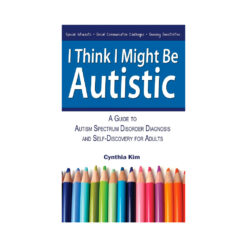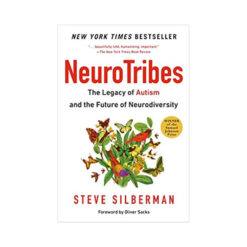Because so many of us turn to the medical community’s Diagnostic and Statistical Manual of Mental Disorders (DSM–5) or the International Statistical Classification of Diseases and Related Health Problems (ICD-11) as our first stop on our road to understanding, and because many of us fail to see ourselves reflected there then move along, I thought I’d take a few liberties. I’ve interpreted the DSM-5 criteria below so a wider variety of people will see ourselves described there and investigate further.
Why?
Because the more we understand ourselves, the better our lives will be.
The Basics
Autism is currently defined as a both a developmental disability and a neurodiversity. Both refer to the differences in brain structure and function that are common to a subset of the larger population. For a brief history, see “The Evolution of ‘Autism’ as a Diagnosis, Explained” in Spectrum News.
First, the medical view:
The DSM-5 Criteria
Here are the DSM-5 Diagnostic Criteria in more relatable language. Yes, this is a loose interpretation. The intent is, as stated above, to make the diagnostic language more accessible so you can more easily see yourself described.
* Remember that the research and diagnostic criteria were created exclusive of historically marginalized communities, particularly communities of colour.
Open the criteria in another browser window so you can follow along.
A: Differences in communication and interaction styles.
- Do you prefer to talk to one person at a time versus a group? Do you have difficulty approaching strangers or interjecting in a group conversation?
- Do you find that you miss non-verbal signals? Is eye contact uncomfortable or even painful? Are you often unsure or forget what to do with your hands or facial expressions in social situations? Have people incorrectly assumed what you feel or think based on your facial expression or body language?
- Do you have trouble making and/or keeping new friends? Are you or have you ever been in a fulfilling romantic relationship? Do you prefer to spend time alone rather than in social situations?
B: Preference for routine and repetition of behavior. This includes exhibiting deep interests in any particular subject or activity.
- Do you tap your foot, bounce your leg, twist your hair or do some other tension-relieving physical motion? Do you enjoy fidgeting with pens, hoodie strings, toys, etc.? Do you repeat interesting phrases or lyrics?
- Do you prefer routines? Are you thrown by unannounced changes to your expectations? Do you have trouble changing your course once you’ve understood how you wish to proceed? Do you enjoy the same meal regularly or find it easier to stick to a meal plan?
- Are you an expert in a particular subject? Do you enjoy the unusual? Do you become deeply interested in a person, place, or thing until you’ve satisfied your curiosity?
- Do you smell odors first or from further away than others? Is your hearing excellent? Do bright lights and sunshine make you squint? Are clothing tags itchy to the point of distraction? Are there fabrics or other items that you love to touch? Do some foods make you want to gag because of mouthfeel? Are others so pleasant you seek them out as often as possible? Are you a supertaster?
C: There’s been evidence and/or memory of the above being part of your life since childhood (though social demands may have exceeded your childhood coping strategies as you matured.)
D: The above causes enough difficulty in your daily life that it’s noticeable by you and others.
E: The above can’t be more easily attributed to another medical issue such as intellectual disability or other developmental delay.
References: The American Centers for Disease Control and Prevention (CDC). American Psychiatric Association. Diagnostic and statistical manual of mental disorders. 5th ed. Arlington, VA: American Psychiatric Association; 2013.
The Neurodiversity View
The stance of the emerging neurodiversity movement is that the traits the autistic community has in common, and that differ from the majority of the population, are a natural variant of our species.
Neurodivergence is viewed as a genetic (i.e. hereditary) variant that has been a part of humanity as long as we have been human.
The neurodiversity view of the DSM criteria is that the noted observable differences largely outcomes of the need to cope with overwhelming social and sensory experiences. For example, preferences for routine and time alone are likely coping strategies to manage stress generated by an intolerant society and social environment not built for inclusivity.
The neurodivergent view of autism as a disability is that society in general does not take difference into account and is therefore difficult, if not impossible, to navigate for those who lie on the ends of the bell curve.
The neurodiversity movement was begun by the Autistic Rights Movement (who were autistic people) in the 1990’s as they sought to distance autism from the pathological view encoded in the DSM. A similar evolution took place in when homosexuality was de-pathologized in the 1980s and eventually removed from the American Diagnostic and Statistical Manual of Mental Disorders (DSM) and the World Health Organization’s International Statistical Classification of Diseases and Related Health Problems (ICD).
The Takeaway
Although the debate is vigorous, the medical and neurodiversity views are not necessarily opposed. As more autistic advocate share their experiences, more of the medical community shift their stance. This directly affects you because how we as a global society define and categorize each other affects how each of us are treated, the opportunities we have access to, and the quality of our lives.
As you learn more about yourself, keep an open mind and know that you are simply and beautifully you, however you or others choose to define you.
For an excellent interpretation of the criteria, I now give you the incomparable Samantha Stein, a.k.a. Yo Samdy Sam. As always, subscribe and follow her to #SupportAutisticWork.

New to autism? Here’s everything you need to get started.





